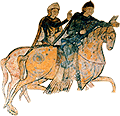![]() The
sons' rebellion
The
sons' rebellion
 The power of Henry Plantagenet over
his extensive domain had only two obdurate enemies: the King of France, and
members of his own family, Eleanor and their sons, who were often opposed to
his authority. The continual claims of the Plantagenet princes to a part of
the inheritance were reminiscent of the behaviour of the sons of William the
Conqueror and represented the trend towards break-up which was a perpetual
threat to the feudal state established by Henry II.
The power of Henry Plantagenet over
his extensive domain had only two obdurate enemies: the King of France, and
members of his own family, Eleanor and their sons, who were often opposed to
his authority. The continual claims of the Plantagenet princes to a part of
the inheritance were reminiscent of the behaviour of the sons of William the
Conqueror and represented the trend towards break-up which was a perpetual
threat to the feudal state established by Henry II.
 At
the start of his reign (1155-1156) Henry had carefully kept his brothers,
Geoffrey and William Longsword, apart. The distribution in 1169 and the will
of 1170 were made to the advantage of very young princes who were scarcely in
a position to do justice to a true title. But in 1173, Young Henry, the elder
son, and two of his younger brothers Richard and Geoffrey opposed their father
over the constitution of a privilege in favour of John, the youngest, who had
been forgotten in the distribution of 1169. The conflict provoked a general
uprising with Normandy as the main field of operations. The revolt was not
subdued until 1174. Henry pardoned his sons, but took Eleanor who had taken
their side, to an English prison.
At
the start of his reign (1155-1156) Henry had carefully kept his brothers,
Geoffrey and William Longsword, apart. The distribution in 1169 and the will
of 1170 were made to the advantage of very young princes who were scarcely in
a position to do justice to a true title. But in 1173, Young Henry, the elder
son, and two of his younger brothers Richard and Geoffrey opposed their father
over the constitution of a privilege in favour of John, the youngest, who had
been forgotten in the distribution of 1169. The conflict provoked a general
uprising with Normandy as the main field of operations. The revolt was not
subdued until 1174. Henry pardoned his sons, but took Eleanor who had taken
their side, to an English prison.
In order to re-establish his authority Henry II confirmed to his sons the rights of the distribution of 1169 but all of them had to give homage as vassals to the king. However the accidental death of Young Henry (1183) was the prelude to new serious conflicts with Richard (1185), and then Geoffrey (1186). In 1189 Henry ended his reign pursued by the allied armies of his son Richard and the King of France.